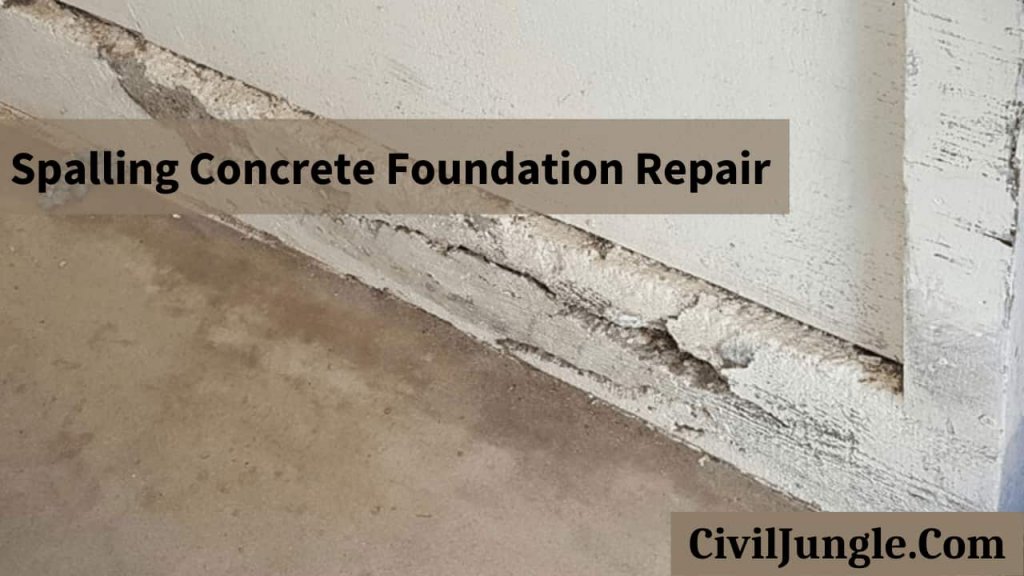
Spalling Concrete Foundation Repair
Spalling concrete foundation repair varies based on damage severity, the type and the location. Spalling concrete foundation repair should be carried out on the basis of recommended codes like ACI Code and BS EN 1504.
Take concrete off the spalled areas for the corroded steel bars to be exposed. Remove the rusts with a wire brush, scrap and clean the exposed steel bars. Use the steel bars with two anti-rust coats.
Apply a binding agent to the surface affected to ensure correct adhesion before patching the area. Use polymer-modified concrete mortar to patch the hacked area.
What Is Foundation Spalling?
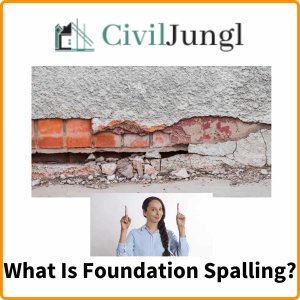
Spalling is due to water coming into the brick, cement or natural stones and the base pushes out, flasks and peels around your home. This is due to the deterioration. It is no cosmetic problem because it can cause severe damage to the structure and can even destroy the whole building.
Spalling concrete foundation repairafter a long period of heavy rain can occur when flooding is long enough to get dry or underneath a cellar that does not control humidity and salt. Poor installation and overloading of the structure can cause spreading and failure to mix the ingredients.
Concerning the corrosion of steel reinforcement used to give the foundation strength, on the other hand, spalling occurs. The main blame for concrete spalling is too much salt in the soil so that the steel reinforcements are covered by alkaline, dense cement.
Concrete foundation problems can cause a number of problems. Even if it seems like a cosmetic problem, concrete cutting can present a serious underlying problem. You must address it as if you have another problem with the foundation.
The spalling breaks off the concrete surface that often reaches the top layers of strengthening steel. Spalls of a diameter may be of 150 mm or more and spalls of 25 mm or more and smaller spalls of ACI 302.1R-4 can also occur.
Concrete spills affect a wide range of constructions, such as framed constructions, multi-story car parks, bridges, jetties, tanks and bundles. Spalling leaves the surface of the concrete twisted and pitted while the add-ons are exposed below.
When detected, it should be properly repaired otherwise, jeopardizing the concrete surface integrity and endangering the member’s ultimate capacity. In addition, spalling may distort the structure’s aesthetic appearance.
Procedure of Spalling Concrete Foundation Repair
Here, the Spalling Concrete Foundation Repair steps are as follows.
1. Clean Spalled Concrete Area
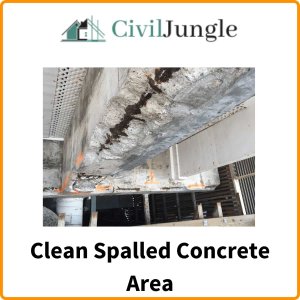
To eliminate bond breaker agents, clean the Spalling concrete foundation repair area to be repaired of any dirt. If heavy stains and dirt have accumulated, a pressure washer may be required to thoroughly clean the Spalling concrete foundation repair surface.
2. Remove Loose Concrete
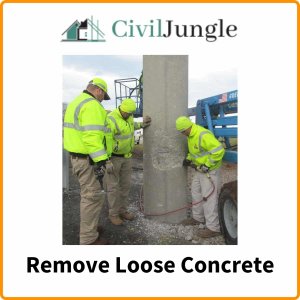
Using a hammer and chisel, remove any loose or broken concrete from the area. Surface preparation may necessitate shot blasting or grinding in some cases. To carry out a Spalling concrete foundation repair, approximately 3.81cm of concrete should be removed.
It is recommended that you tap the Spalling concrete foundation repair area vigorously with a hammer to check for potential deterioration. A hollow sound indicates deteriorated concrete and should be avoided. This eliminates the need for additional Spalling concrete foundation repair in the future.
It is recommended to cut the rectangular section of the concrete so that patching can be done and the concrete can be contained within the specified area. This produces better results. Finally, use a vacuum to remove any dust or debris.
3. Clean and Coating Corroded Steel Bars
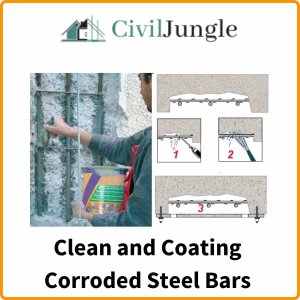
Clean the rebar with a wire brush to remove any corrosion or dirt, and then apply a protective coating to prevent rusting for Spalling concrete foundation repair .
4. Apply Repair Material Mixture
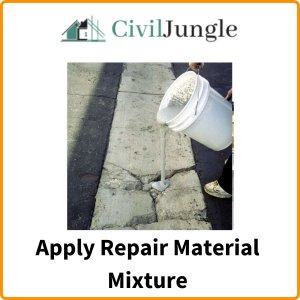
Depending on the size of the repair and its depth, a variety of products can be used. If the spalling depth is less than one-third of the concrete thickness, the concrete can usually be Spalling concrete foundation repair.
However, if the damage exceeds one-third of the concrete depth, steel bars may be required, and a full depth restoration may be required. To improve bonding, roughen the affected surface and apply a suitable adhesion agent.
After that, patch the area with an appropriate admixture. Portland-cement-based or epoxy-based patching materials are the most commonly recommended. It is necessary to choose a patching material with a thermal expansion similar to that of the existing concrete.
Consider the ambient temperature when patching because it has an effect on the patching material. The ambient temperature must be higher than 4.5 degrees Celsius. A cementitious overlay can be used to repair damage on driveways, walkways, and other horizontal surfaces.
If the affected area is adjacent to a joint, ensure that it is properly restored to allow for member expansion.
5. Finishing of Spalling Concrete Foundation Repair
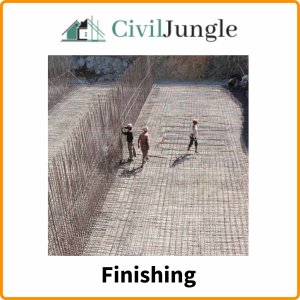
Scrape off the excess product using a margin trowel and apply the final touches to the surface to level it, as illustrated in. Curing Cure the material thoroughly to ensure that it achieves the desired strength.
Apply a coat of paint or a coat of varnish to the repaired surface. To prevent Spalling concrete foundation repair, wait until the material has completely dried before applying paint or a waterproofing membrane.
Signs of Foundation Spalling
While the foundation damage cannot be seen from outside, if something happens in the structure, the concrete around your house is affected.
Should the base be damaged, the ground under the concrete will start to move, and many aspects of your home will begin to be affected. A house which is experiencing this deterioration probably has these signs;
- Floor and wall cracking
- Deck breakage
- Floor pitch
- Lower walls
- Slender fireplace
- Glued doors and windows
- Blasting in walls of concrete
How Does a Foundation Spalling Form?
- Spalling forms during defloration lead to the surface of the brick or concrete being expanded by internal salts and minerals for a long period.
- Water is the primary cause of spalling, as previously established. Water from heavy rain, the water from the rinse or the roof surface, water collected from humid soil, or moisturizing in the form of steam from the building, can lead to splitting.
- Whether the water proceeds from up or down the surface, the water will freeze or thaw within the concrete if it has been trapped near the foundation’s surface and beginning to harm the foundation.
- The weather is cold and thawing occurs most of the time. Any caught water evaporates more slowly in colder climates, causing water to freeze and grow and causing spread. The degradation depends on how often the bricks are screened and how much moisture is present.
- Embedded steel reinforcement corrosion because the rust products occupy more volume than the original steel, resulting in a pressure which spells the concrete.
- Exposure to fire causes free water changes to stem in concrete and creates internal expansion in concrete and therefore spreads out concrete.
- Cycling with freeze and thaw
- Alkali-Silica Expansive Effects
- Insufficient cover depth for strengthening
- The reinforced steel is covered with low-quality concrete.
- Joint spells are frequently caused by unsuitable joint spillage.
- Differences in shrinking between the top and base races, the drying of the binding rail before the top of concrete are placed, etc. Bond failure in a two-stroke construction.
How Can You Fix a Foundation Spalling?
The damage is determined by the extent of the damage. If it is obvious that there are minor differences, you can fix them as follows;
- Remove all dirt and loose surface from salted cement
- Treat any strengthened steel so that it does not roost
- saturate concrete to match the already existing concrete with bonding agent before using mortar and brush.
- Top with a damp cloth or keep a sprinkler on for a few days so that it does not dry up too quickly
- Early-entrance dry-cut helps prevent spalling in concrete floor slab.
- To keep water from entering the concrete, apply a good water sealant to the finished surface.
- Proper concrete management during dumping so that adequate joint coverage and placement at correct positions is ensured.
- Prevent excessive water from being spilled into a concrete mixture.
Spalling Concrete Foundation Repair
- Remove the Spalled Concrete to Remove All Dirt and Loose Surface.
- Treat Any Reinforced Steel to Prevent It from Rusting.
- Saturate the Concrete with Bonding Agent Before Applying Mortar and Brush Finish to Match Existing Concrete.
- Cover the concrete with a damp cloth or keep a sprinkler on for a few days, so it doesn’t dry out too fast.
Foundation Spalling Repair
Spalling is a particularly dangerous kind of foundation problem because most homeowners don’t recognize that it’s not the cosmetic issue it appears to be. The physical damage that occurs during spalling is relatively insignificant, but it’s a sign of much more severe problems that need to be addressed immediately.
Spalling Concrete Wall Repair
To fix a concrete wall that is spalling, you first need to cut into the concrete around the spalled area. Make the cut about three-eighths of an inch deep with a circular saw. Next, use a hammer and chisel to remove the concrete from the cut area. This step should expose the reinforced steel bars.
Foundation Spalling Repair Cost
| Repair Type | Average Cost |
| National Average | $4,666 |
| Typical Range | $2,143 – $7,440 |
| Low End – High End | $495 – $14,000 |
Spalling Concrete Block Repair
When the spalling damage is shallower than 1/3 of the concrete’s thickness, the concrete usually can receive a surface repair.
After the overlay has set completely, a waterproofing membrane should be applied to prevent spalling from recurring. Patching may be a repair option for random or localized damage.
Spalling Concrete Foundation
Spalling is the deterioration of the concrete or masonry around your home as a result of water entering into brick, concrete or natural stone and cause the foundation to push outward, flake and peel.
Spalling Foundation Wall
Spalling is a particularly dangerous kind of foundation problem because most homeowners don’t recognize that it’s not the cosmetic issue it appears to be.
The physical damage that occurs during spalling is relatively insignificant, but it’s a sign of much more severe problems that need to be addressed immediately.
Spalling Concrete Foundation Wall
Remove all loose material with a small paint scraper, then brush off the dust. You can use packaged masonry or concrete repair mixes, available at home improvement stores, or buy a bottle of concrete bonding agent and a bag of mortar.
Brush the bonding agent onto the old concrete and let it sit until tacky.
[/su_box]Frequently Asked Questions (FAQ)
What Is Spalling in Concrete Foundations?
Spalling in concrete foundations refers to the flaking, peeling, or breaking off of the concrete surface, often due to moisture infiltration, corrosion of steel reinforcement, or other forms of deterioration. It can lead to significant structural issues if not addressed promptly.
What Causes Spalling in Concrete Foundations?
Common causes of spalling include:
- Water Infiltration: Moisture entering the concrete and causing expansion and cracking.
- Corrosion: Rusting of steel reinforcements within the concrete due to exposure to moisture or salts.
- Freeze-Thaw Cycles: Repeated freezing and thawing of trapped moisture causing the concrete to expand and contract.
- Poor Quality Concrete: Use of low-quality materials or improper mixing and curing practices.
How Can I Identify Spalling in My Foundation?
Signs of spalling include:
- Cracks or flaking on the concrete surface.
- Exposed steel reinforcements.
- Pitting or uneven surface texture.
- Changes in structural integrity or visible damage to adjacent areas.
What Are the Steps Involved in Repairing Spalling Concrete Foundations?
The repair process generally involves:
- Cleaning the Area: Removing dirt, debris, and loose concrete.
- Removing Damaged Concrete: Chiseling away spalled areas to expose the steel reinforcement.
- Cleaning and Coating Steel Bars: Removing rust and applying anti-corrosion coating.
- Applying Repair Material: Using polymer-modified mortar or concrete to patch the area.
- Finishing and Curing: Leveling the surface, curing the repair material, and applying protective coatings.
Can I Repair Spalling Myself, or Should I Hire a Professional?
Minor repairs might be manageable as a DIY project, but extensive spalling or underlying structural issues are best handled by a professional contractor. They can ensure the repair is done correctly and address any underlying problems.
How Much Does It Typically Cost to Repair Spalling Concrete Foundations?
The cost can vary based on the extent of the damage, repair methods, and location. On average, repairs can range from $2,143 to $7,440, with some projects costing as low as $495 or as high as $14,000.
How Can I Prevent Spalling in My Concrete Foundation?
Preventive measures include:
- Proper Sealing: Applying water-resistant sealants to the concrete surface.
- Good Drainage: Ensuring proper drainage around the foundation to prevent water accumulation.
- Quality Construction: Using high-quality materials and following best practices during construction and maintenance.
- Regular Inspection: Monitoring and addressing any signs of damage or moisture issues promptly.
What Should I Do If I Notice Spalling Early?
If detected early, you should clean the affected area, address any underlying issues, and perform timely repairs to prevent further damage. Regular maintenance and monitoring can help manage and mitigate spalling effectively.

